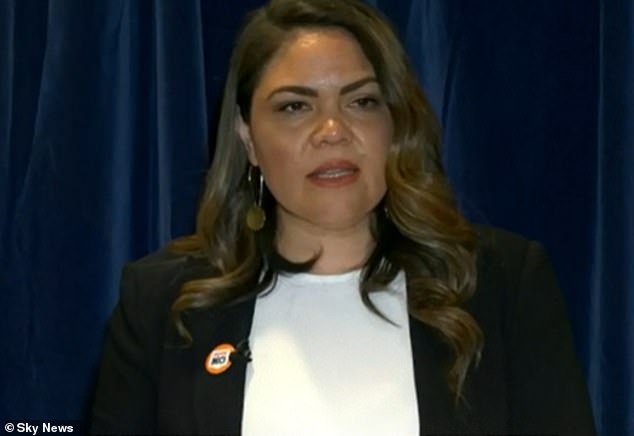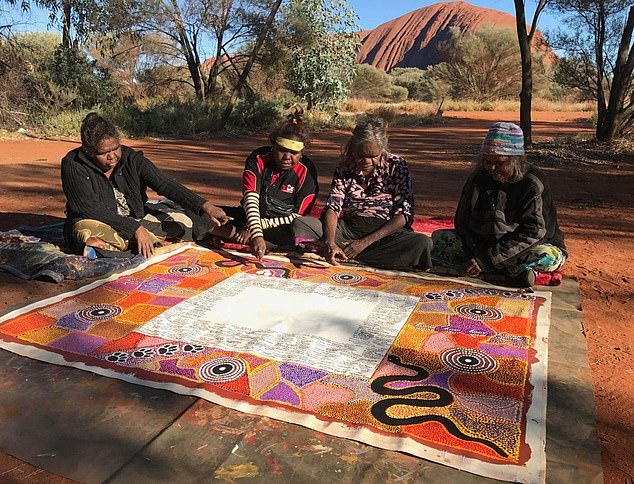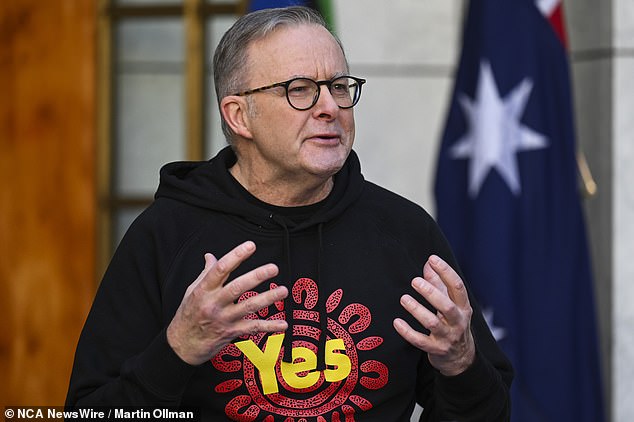Jacinta Price takes aim at three key words at the centre of Anthony Albanese’s Voice to Parliament campaign
No campaigner and Opposition Indigenous Affairs spokeswoman Jacinta Nampijinpa Price has addressed Anthony Albanese’s claims that the Voice is merely an advisory body.
Speaking to the national press club, the Country Liberal Party senator argued that the words ‘advice’, ‘opinion’ or ‘opinion’ do not appear in the proposed amendment to the constitution. Instead, the word ‘representations’ is used.
“Nowhere in the question that will be put to Australians, or in the proposed chapter we are voting on, do the words ‘advice’, ‘opinion’ or ‘opinion’ appear,” Senator Nampijinpa Price said.
‘If the Prime Minister had really intended this body to be a simple advisory body… then that would have been set out in the proposed chapter.
“You see, words matter. The words proposed to amend the Constitution of our country are of great importance.”
Senator Nampijinpa Price also leveled accusations that the No campaign is “fear-mongering” about the Voice, arguing that their concerns stem from comments made by the government’s own hand-picked advisers.
She cited comments from Yes campaigners Teela Reid and Thomas Mayo about how the Voice would work.
Ms Price quoted comments from Indigenous lawyer Teela Reid during her speech to the National Press Club on Thursday
“What we do know is that many of the Voice’s key proponents hold very different views from those of the government.
“No matter what the government, the advocates and the activists say about what The Voice will or won’t do, the fact is they don’t know,” Ms. Price said.
‘They don’t know who will be on The Voice. They don’t know what they will make their statements about.
‘They talk about it as the first step towards reaching a treaty, reparations, compensation and a mechanism to punish politicians. Presumably this means politicians like me who aren’t afraid to stand up to them.’
Ms Nampijinpa Price referred to Ms Reid’s criticism of statements by Indigenous Australians Minister Linda Burney that a vote would not be interested in changing the date of Australia Day.
Ms Reid said: ‘It may be the Australian government’s preference to keep things like Australia Day, but trying to limit the scope of what people can advocate for change is just plain stupid.
“There is no shortage of false claims that it is the No campaigners who are spreading fear about the reach of the Voice. But the reality is that our concerns come from the Voice’s own advocates.”
Ms Nampijinpa Price also questioned the government’s repeated assurances that the Voice would only care about healthcare, education, employment and housing.
She described these claims as “misleading presumptions,” again harking back to her belief that the government simply cannot know.
“The government has repeatedly promised equal representation, gender balance and youth representation. But these are not promises the government can make.”
She believes the money put into the advisory body would be better spent directly on turnkey projects that will make an immediate difference in the community.
The Country Liberal Senator said she has been called a “sell-out” and subjected to racist abuse and threats of violence simply because she “wants to prevent children from being abused”.
‘Because I want to prevent women and men from being murdered. The truth is that despite all the moral pretenses and virtue signaling about telling the truth, there is no real appetite in Canberra to tell the truth or hear the truth.”
Ms Nampjinpa Price said the campaign for an Indigenous voice in Parliament is underpinned by a “lie… that Indigenous Australians have no voice”.
‘We The Indigenous Minister for Indigenous Australians has told us that Indigenous people do not get a say in the policies or decisions made on our behalf.

Senator Nampijinpa Price has leveled her accusations that no Indigenous Voice campaign is ‘fear-mongering’, arguing that the concerns stem from comments made by hand-picked government advisors

After years of doing things ‘for’ Aboriginal people, often with the best intentions, the Prime Minister said giving Parliament a voice would allow Indigenous people to come to the fore on issues of vital importance to them.
‘I am one of 11 Indigenous voices currently in Parliament… The patronizing suggestion that we cannot focus our efforts on improving the lives of marginalized Aboriginal and Torres Strait Islander people because we are looking after the electorate must be resolutely are rejected.’
Ms Nampijinpa’s parents Bess and David stood in the crowd with her husband Colin, as did some of her colleagues.
“My hope is that after October 14, after defeating this voice of division, we can hold accountable the structures in place, move away from the assumption that inner-city activists speak for all Aboriginal people, and refocus on the real problems: education, employment, economic participation and protection against violence and sexual violence.’
After years of doing things ‘for’ Aboriginal people, often with the best intentions, the Prime Minister said giving Parliament a voice would allow Indigenous people to come to the fore on issues of vital importance to them.
But Ms Nampijinpa Price raised concerns about the language used by some of the government’s hand-picked advisers, including Professor Marcia Langton.
Daily Mail Australia revealed an unearthed comment Professor Langton made wishing politician Mark Latham a “slow, painful death” after several videos emerged of her discussing racism in Australia.
In one article, Professor Langton described Ms. Nampijinpa Price and her mother, Bess, as “colored help” to conservatives in “rescuing the racist image of (their) outfits.”
Elsewhere, she accused hardline No voters of ‘spewing racism’.

Prime Minister Anthony Albanese argues that the Voice is a simple proposition
Ms Nampijinpa Price said it was “backward, neo-colonial, racial stereotyping” to suggest all Indigenous Australians should think the same and support the same policies.
“Whatever the outcome on October 14, it is imperative that we examine the failures of our past to understand how we can do better. Our nation’s rulebook belongs to every Australian. And it is not a document that should be taken for granted or compromised for the sake of atmosphere.
“To pass such an important amendment, the Prime Minister owes the Australian people a clear, concise and realistic demonstration of how his vote will deliver the results all good Australians want for our marginalized.”
Ms Nampijinpa Price previously detailed her concerns in an interview with Daily Mail Australia.
When Indigenous Affairs Minister Linda Burney emphasized early in the debate that issues as close to home for Aboriginal people as Australia Day would not fall under the Voice’s remit, Ms Nampijinpa Price had her doubts.
“She can’t say that,” said Mrs. Nampijinpa Price.
‘Everything plays a role. Unless there is a specific list pre-established by Parliament as no-go areas, nothing is off the table at this point.”
But there is also the fear that well-meaning politicians may not know the value of their words when they refer to an advisory body that is ‘culturally informed’.
“There are no real details about what being culturally informed actually looks like,” Ms. Nampijinpa Price warned.
‘There are elements of traditional culture that do not recognize equality between men and women.
‘When it comes to decision-making, we often talk about a patriarchal society.’
